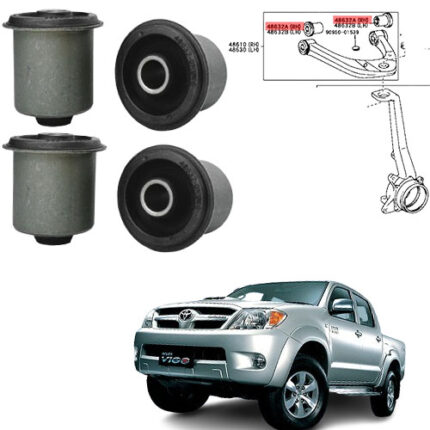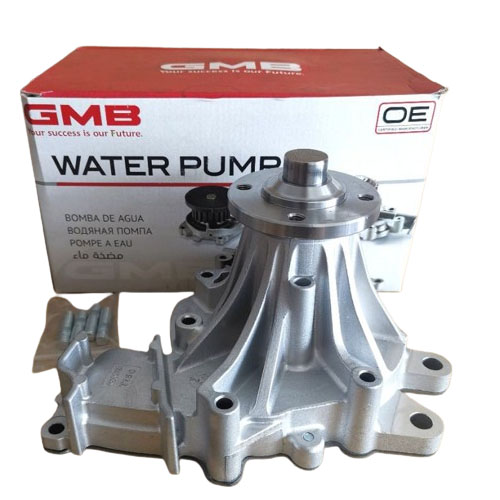-6%
Find the best Prices for WATERPUMP TOYOTA HILUX VIGO 1KD/2KD in Nairobi, Kenya
The Heartbeat of Cooling Systems: Exploring the Significance of Water Pumps in Vehicles
In the intricate realm of automotive engineering, water pumps emerge as unsung heroes, quietly but crucially contributing to the optimal functioning of a vehicle’s cooling system. These relatively simple yet vital components play a central role in regulating engine temperature, preventing overheating, and ensuring the efficient operation of internal combustion engines. This exploration aims to uncover the importance of water pumps, delving into their functions, types, potential issues, and the profound impact they have on the longevity and performance of an automobile.
Understanding Water Pumps:
A water pump is a mechanical device designed to circulate coolant or antifreeze through the engine and the radiator, facilitating the heat exchange process that regulates the temperature of the engine. Typically belt-driven, water pumps are integral components of the cooling system in most internal combustion engines.
Functions of Water Pumps:
- Coolant Circulation: The primary function of a water pump is to circulate coolant throughout the engine and the radiator. This process is essential for transferring heat away from the engine components to maintain an optimal operating temperature.
- Heat Dissipation: As coolant flows through the engine, it absorbs heat generated during combustion. The water pump facilitates the transfer of this heat to the radiator, where it is dissipated into the surrounding air.
- Preventing Overheating: By maintaining a consistent and controlled temperature, water pumps play a crucial role in preventing engine overheating. Overheating can lead to severe engine damage and compromise overall vehicle performance.
- Efficient Engine Operation: An efficiently functioning water pump ensures that the engine operates within its designed temperature range. This is essential for optimal combustion, fuel efficiency, and the overall longevity of the engine.
Types of Water Pumps:
- Mechanical Water Pumps: Found in most traditional internal combustion engines, mechanical water pumps are typically driven by a serpentine belt connected to the engine’s crankshaft. They rely on the engine’s mechanical motion to circulate coolant.
- Electric Water Pumps: Electric water pumps are becoming increasingly common, especially in hybrid and electric vehicles. These pumps are powered by electricity, providing more precise control over coolant circulation and allowing for on-demand operation.
- Auxiliary Water Pumps: Some vehicles feature auxiliary water pumps that assist in circulating coolant when the main engine is off. This is particularly beneficial for hybrid or electric vehicles that may need to cool components even when the internal combustion engine is not running.
Importance of Water Pumps:
- Engine Temperature Regulation: Water pumps are critical for maintaining the optimum operating temperature of the engine. Consistent temperature control ensures that the engine operates efficiently and prevents potential damage due to overheating.
- Prevention of Engine Damage: Overheating can lead to severe engine damage, including warped cylinder heads, blown gaskets, and even engine block damage. A properly functioning water pump is a frontline defense against such catastrophic scenarios.
- Enhanced Fuel Efficiency: Efficient engine operation, facilitated by an optimal cooling system, contributes to improved fuel efficiency. When the engine operates at the right temperature, combustion is more effective, leading to better fuel economy.
- Extended Engine Lifespan: By preventing overheating and maintaining proper operating conditions, water pumps contribute to the longevity of the engine. A well-maintained cooling system, including the water pump, helps ensure that the engine components experience less wear and stress over time.
- Climate Control System Support: In some vehicles, water pumps are integrated into the climate control system, contributing to the regulation of cabin temperature. This is particularly relevant in vehicles equipped with advanced climate control features.
Common Issues and Maintenance:
Despite their critical role, water pumps can experience issues over time. Common problems include:
- Leakage: The seals or gaskets in a water pump can wear out, leading to coolant leakage. This can result in reduced cooling efficiency and potential engine damage.
- Impeller Damage: The impeller, which circulates coolant, can suffer from corrosion or damage. A damaged impeller may fail to circulate coolant effectively, leading to overheating.
- Bearing Wear: The bearings that support the water pump shaft can wear out, causing noise, vibrations, and potential pump failure. Regular inspection and timely replacement of worn bearings are essential.
- Coolant Contamination: Contaminants in the coolant, such as rust or debris, can affect the water pump’s performance. Flushing the cooling system and maintaining clean coolant are crucial for preventing contamination-related issues.
- Belt Wear: In the case of mechanical water pumps, the drive belt can wear out over time. Regular inspection and timely replacement of worn belts are essential for preventing pump failure.
Conclusion:
In the intricate symphony of vehicle components, water pumps stand as guardians of engine temperature, ensuring the harmonious and efficient operation of internal combustion engines. Their role in preventing overheating, enhancing fuel efficiency, and contributing to engine longevity underscores their significance. Recognizing the importance of water pumps emphasizes the need for regular maintenance, inspections, and prompt replacement when necessary. These seemingly humble components, tucked away within the engine bay, epitomize the meticulous engineering that defines the reliability, longevity, and performance of modern automobiles.



